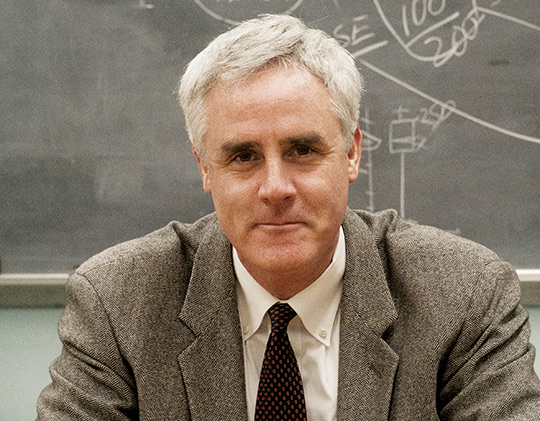The following is a translated excerpt of a recent article in the German magazine Die Zeit that prominently features the work of Teachers College psychologist Peter Coleman and TC’s Morton Deutsch International Center for Cooperation and Conflict Resolution. The full story is an account by the journalist Bastian Berbner of his attempts to dialogue with countrymen of radically opposed political views, including a member of the far-right, neo-Nazi party NPD. Berbner was prompted by Zeit Online’s recent effort, “Germany Talks,” which paired 8,000 people with opposing views for face-to-face conversations.
Berbner, whose own views skew more to the left, writes “I, too, am scared by the attack of right populists on our liberal democracies. But I am also scared by something else: The sentence, ‘Talking to those people is pointless.’ That is something that can be heard from both the left and the right, and it describes a new speechlessness which appears dangerous to me… Is talking really pointless? Or is it just more convenient not to?”
We pick up the story as Berbner turns to Teachers College's resident expert...
In a brick building at Columbia University in New York sits a man in a cramped office who can likely answer that question better than anyone. Peter Coleman, who leads the Difficult Conversation Lab – a laboratory that is the first of its kind in the world – researches how to disagree correctly.
Ninety-five percent of all conflicts are easy to solve, says Coleman. Who does the dishes? Pasta or pizza? Buy or rent? Sit down, talk about it, that’s it. He is interested in the other 5 percent: those conflicts that are so intractable that they barely appear resolvable. Tantalus, the figure from Greek mythology, is a good example.
[Read an article on Coleman’s studies of sustainable peace. Also read an article on journalist Amanda Ripley's visit to Coleman's Difficult Conversations Lab]
Because Tantalus dismembered his son and fed him to the gods, they cursed his family. They banished him to the underworld, petrified his daughter, and killed 14 of his grandchildren. Two of the survivors, Atreus and Thyestes, first murdered their half-brother, then one seduced the wife of the other and stole his golden fleece. At the dinner to make up, Atreus cooked and served his brother’s own children. Generation for generation it continued; murder, cannibalism, incest, and on the side, the family drama caused the Trojan War. All because one person made a mistake. The conflict almost led itself. Just like some marriage feuds. Just like the conflict in the Middle East.
Imagine if any one of Tantalus descendants had said: Stop! We are going to sit down now and talk about this! The way that can work is what Peter Coleman researches.
Coleman’s most important finding is this: The more complexity people have in their lives – cognitively, emotionally – the more tolerant they are and the more constructively they will argue.
Coleman smiles when I tell him that some in Germany say that one shouldn’t talk to politicians and supporters of the AfD [another far right German political party]. “Who else are you going to talk to to solve political conflicts? Your friends?” he asks. “And beyond that, the oldest rule: in the end, is: whoever knows their opponents, wins. And for that, you have to talk to them.”
Coleman has observed hundreds of pairs of political opponents arguing in his lab – about abortion, about euthanasia, about capital punishment. Many conversations become personal very quickly. Some escalated. But others proceeded surprisingly constructively and ended in a compromise. Coleman and his team noticed that in the latter conversation more questions were asked. The subjects were curious, put themselves in the shoes of their opponent. Sometimes they asked, “One moment, just to make sure I got this right, what you are saying is…” Then they repeated the opponent’s position, and if they had misunderstood something, refined their understanding until the opponent said, “Yes, exactly”.
Who are these constructive arguers? What makes them more tolerant than others? Coleman found similarities.
A person has many identities. Let us imagine a woman who lives in a major city, is vegan, is politically active for the green party, is a feminist, and is a proponent of same sex marriage. All of that fits together nicely, her identities are congruent.

DISAGREEING CORRECTLY Coleman is an expert on fostering conversations among people with radically opposing viewpoints.
Let’s imagine another person. She is a lesbian, but against gay marriage, she supports Seehofer [Horst Seehofer, leader of Germany’s Christian Social Union], but is also in favour of open borders, she is a Muslim, but also puts up a Christmas tree each year. That does not fit together; her identities are incongruent. Coleman calls this “high complexity”.
Coleman’s most important finding is this: The more complexity people have in their lives – cognitively, emotionally – the more tolerant they are and the more constructively they will argue. That is: He who doesn’t neatly fit into a drawer is more reticent to put others in drawers. He doesn’t judge people as quickly, and where others assume hostility, he finds commonality.
Which begs the question: Can these qualities be learned?
One of Coleman’s colleagues performed an experiment. She divided pairs of opposing arguers into two groups. She asked one group to read two texts about abortion, one arguing in favour of the right to abortion, the other against. Both read like briefs written by sharp-tongued lawyers: The language was aggressive, the tone confrontational. The conversation pairs in the other group were given only one text. It contained the same arguments, but this time the arguments were intertwined, the language was balanced, the tone moderate.
After completing their readings, the subjects were asked to discuss abortion. The pairs who had read the texts that resembled legal briefs turned out to be more aggressive, while those who had read the nuanced documents were more constructive in their conversations. The psychologists had turned these opponents into better arguers.
Then the scientists discovered something else: the pairs having read the nuanced text about abortion were more ready to compromise even when they were asked to discuss something else, such as capital punishment. Cultivated on a small scale, complexity colours one’s nature just like a few drops of paint would a tub of water.
When I ask Coleman how I can make my life more complex, he tells me to get out of my bubble and meet strangers – the more foreign, the better. Why not openly seek commonalities with my biggest political opponent? I consider whether to meet an AfD voter. Coleman tells me: the more extreme the experiment, the better. Be courageous in what you do.
